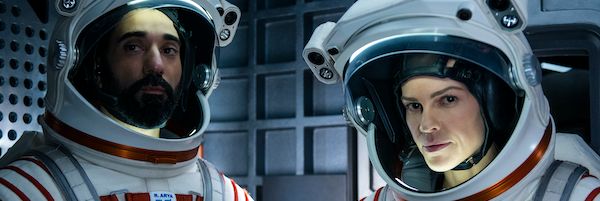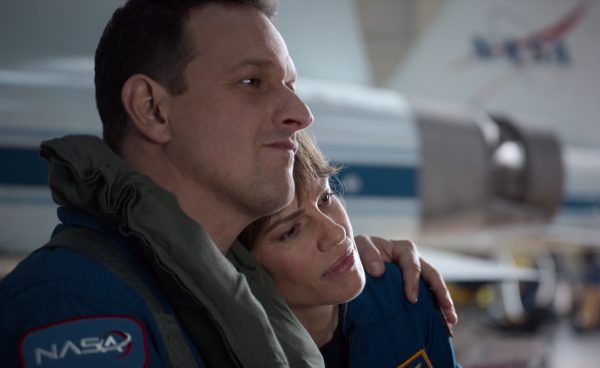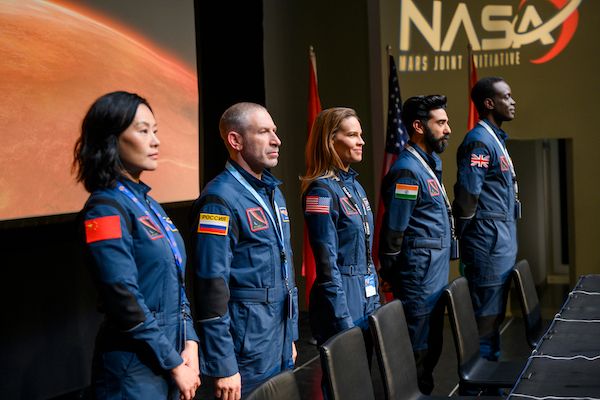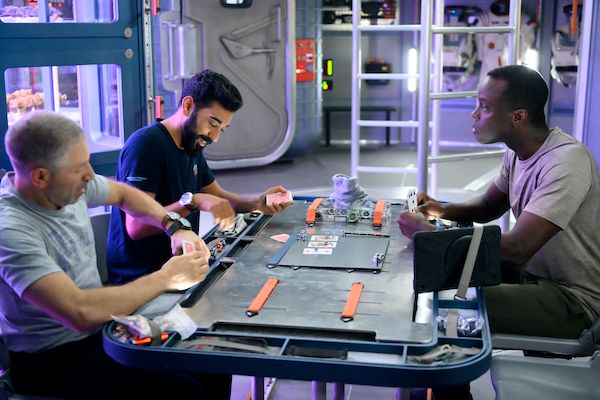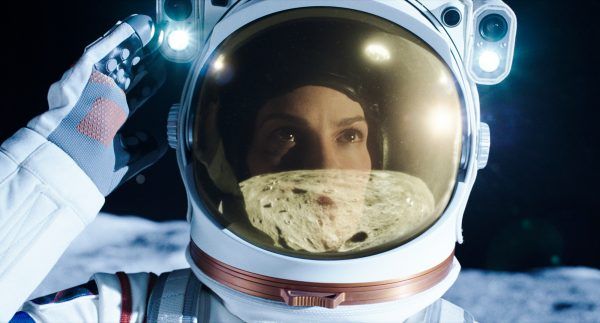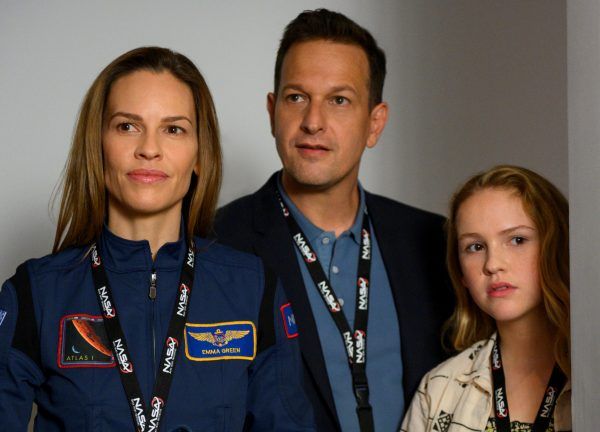[Editor's note: The following contains spoilers through the Season 1 finale of Away, "Home."]
Netflix's Away might be set in space, but there are no aliens, no laser battles — instead it takes a very real-world approach to what might happen (what may happen) when an international initiative successfully launches a crewed mission to Mars. The first season, launched this weekend, features a cast led by Oscar-winner Hilary Swank and Josh Charles, and tracks the emotional and physical toll it takes to leave behind your family — your entire world — to risk your life traveling through the vacuum of space towards a new world.
For showrunner Jessica Goldberg and creator Andrew Hinderaker, making Away meant finding a way to balance the scientific elements of the story alongside the intricate character stories, which encompass faith, relationships, and interpersonal conflict. It's an increasingly difficult journey for Emma (Swank) and her fellow astronauts, but at the end of the season, they do ultimately arrive safely at their destination, leading to the question... what's next?
No second season has been officially greenlit, but the end of the first season makes it pretty clear what the action of a Season 2 would focus on. Below, Goldberg and Hinderaker talk about bringing together all of the show's complicated components, why things began with a rift between the crew, and how the astronauts' proposed "final words," revealed in the finale, came to be.
COLLIDER: So, to start things off, the initial genesis of the show was from a magazine article, but talk about how it came across both your plates.
ANDREW HINDERAKER: Yeah. Jason Katims and Matt Reeves brought me this really extraordinary Esquire article — it was about the astronaut Scott Kelly and his long-duration mission aboard the International Space Station and what I found so incredibly moving about the article was really two things. One was the way that Chris Jones, the journalist, goes into depth about how the International Space Station came to be. And this improbable idea of countries that normally don't work together, working together to create the space station and how that could be an analog for the international mission to Mars. And then, just as profoundly, he talks about what that was physically and emotionally for Scott Kelly. He was up there when there was an emergency with his family; his sister-in-law was shot and he tried to navigate that from a distance. And I then pitched Jason and Matt this series, with Hillary's character Emma at the center of it, who was leading the international effort.
So that was the moment that was so incredibly powerful for me was being away — I'm somebody who's in a long-distance relationship with my partner, who lives with a serious medical condition that was diagnosed when I was away and we navigated that. And so that was the emotional core of the series and how that story came to be. And then the opportunity arose to work with Jessica and have her run the show, which was thrilling for me having worked for her on The Path. And just knowing what the deep personal connection that Jess would bring us as a successful working mom. So I was privileged to be pitching her the series.
JESSICA GOLDBERG: Andrew and Jason sent me the pilot and then immediately I was just so blown away by this woman it was like the ultimate working mom show. She loves her family. She loves her work. She's ambitious and cares about her family deeply. And I could see that portrayed with such complexity. It was so exciting. And I wanted to really continue to tell that story as well as like, "Wow." Like here was an opportunity in such a divisive time to talk about the world sort of coming together for exploration and for great scientific achievement. So I said, "Sign me up."
One really notable thing about the show is that it starts from a place where there's very active dissent between amongst the team, which feels like a shift from other space-oriented narratives. What was important for you about that?
GOLDBERG: Really, to start with their divisiveness. And then they started coming together over the course of the season — without giving too much away. The assumption is that China and the US will never be in a spacecraft together, but what if they were? I just love the audacity, that dreams about how people break down each other's barriers. And if we communicate off the ball, I don't know...
HINDERAKER: Interestingly, the event that happens in the pilot that creates a lot of that divisiveness was very loosely inspired by a story that I heard from an astronaut who I'm sure would prefer to remain anonymous. But it's a situation that arose on the space station that ultimately could have been a problem. And it's partly because one of the astronauts wasn't listening to the other ones and, as Jess was pointing out the possibilities for that, I think does get heightened when you have so many different personalities and so many different cultures all coming together.
But then what I think the show explores is the possibility of what happens if you can transcend that and find a deeper reference of working together and bringing everyone's respective strengths, and everyone's perspective bolsters, and everyone brings their respective expertise to the table. There are greater possibilities for challenges, but greater possibilities for achievements. And that places a challenge in them, and then work from there.
Religion plays a pretty significant role in Away, for a show that's about space and science — and you included not just one faith, but several different faiths into the fabric of the show.
GOLDBERG: Yeah I mean, it's just so interesting, because like a lot of whenever we talk to people like astronauts, we always ask like what would be the greatest achievement on Mars and there's always this question of finding life and what that means. So we have this character of Kwesi — he has been adopted by a Jewish family so faith plays very prominently in his world. Whereas Vivian's character Yu, who's from China, is I guess you would call her an atheist at the beginning. And you know, it's just so exciting to have these people from all over that bring with them really different points of view about creation. So that's... I don't know if I'm answering your question, but that's what it made me think of.
I mean, basically, what was important to you about making sure that conversations about faith were a part of this show?
GOLDBERG: I mean, Kwesi's character — that is how he grew up. It's what he believes in his bones of the character. It was a choice that came from character.
HINDERAKER: We had a really unbelievable conversation with somebody at Jet Propulsion Laboratory talking about all the different missions with the rovers to Mars. And one of the goals is to either discover proof of life on another planet. And I just kind of asked on a very basic level, what does that change, do you think, if that discovery is made? And she said, "everything." She was also talking about faith and so I think there's something intrinsic to what the story is exploring this, that intersects with faith.
So the season ends with them arriving on Mars. What was important to you about making that the endpoint of Season 1, and how much talking are you guys doing right now about future seasons?
HINDERAKER: The day one idea from the pitch of the show was that it would begin with Emma looking back at Earth from the moon and ends with her looking back at Earth from Mars. That's just so much of the show is about.
The only other thing I'll add is that Jess and I got to see InSight, the probe, land on Mars in 2018. We were at Jet Propulsion Laboratory with the people who helped design it as it was approaching Mars. And with them in the room, through this pin-drop silence as they're watching their life's work either go up in flames or slam onto another planet. And the moment — it was so exciting and so moving, there was a small moment where the first photograph from InSight came back, a dust-spackled photograph of another planet.
And we all burst into cheers and then one of our writers turned to us and said, "Imagine now that there had been people on it." So it felt like that's what we wanted to build to.
In terms of Season 2, I always felt like if there was a final card that I would love to have on the season, it would be "Away will return for Season 2... on Mars." Part of what we're promising is what that crew experiences at the very end, we now we get to live in a new world.
GOLDBERG: Yeah. And I think just to add to that, going through that emotional journey, because you've seen the show so you know there's a certain point halfway through, and this would really happen where you can no longer see each other on Skype or on your computer and everything has to be text and there's a delay that's 20 minutes. And it's been hard enough for all of us having to realize like, "Oh I had to isolate two weeks before I can see my mother." And those steps are so important to the emotional journey of these characters.
In general, when you were coming at this, one common theme of a lot of stories that focus this heavily on space travel is space is a terrifying place that wants to kill you. What were your feelings about space as a place to set a story? And did they change by the time you finished the first season?
HINDERAKER: I think the way I thought about is that space is a place that demands you change. One of the things that that first article talks about is the way when you go on a journey like this, your body changes in space and literally parts of your body, like your heel that you don't need to use anymore starts to slip off of your foot ... in a way that's telling you everything you've learned about up and down goes out the window. It'd be different in many ways to be stripped of our armor and to evolve. And I think that's what we see the consequences for being in space. But I don't think of it necessarily as a merciless enemy, so much as an unforgiving agent of transformation.
GOLDBERG: Yeah, I think for me, I came to this show falling so in love with the personal stories, with the intimate stories. And my discovery was to really understand the importance of space travel and the dream of it, the hope of it like, "Oh, if we can do this, like who knows what else we can get, we can cure cancer." Before the research and before talking to astronauts, I was more obsessed with the natural world around me, of trees and mountains. And suddenly I understood these limits need to be pushed for us to go to the next places of achievement. So that was a real revelation, working on this show.
So, when it came to the final words discussed in the season finale, was it very easy to figure out what they should be? Or was that something you struggled with?
HINDERAKER: This is the best question we're ever going to be asked.
GOLDBERG: I'm so happy you're asking this because this was a moment in the writer's room and something had started to happen to Andrew and I during the writing. It's not even like we hang out, we just work together, but we had this idea that they'd send their last phrase and we looked at each other and we just said it at exactly the same time.
Oh, that's eerie.
GOLDBERG: Isn't that the case?
HINDERAKER: Yeah, totally true. And then the other writers kind of like slinked out of the room.
GOLDBERG: Yeah. They were like "this is too weird, you guys are too alike." But we just both knew exactly at that moment. It was very strange.
HINDERAKER: Yeah, it was fun. We looked at each other and we both said "It was worth it." At the same time.
Away Season 1 is streaming now on Netflix.

